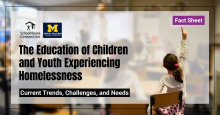0
Infographics
Community:
Feb 7, 2023
An analysis of recent trends in child and youth homelessness that show the impact of the pandemic, including a disproportionate decline in enrollment and increase in chronic absenteeism.
Authored by: SchoolHouse Connection and University of Michigan
Topics: Attendance, COVID-19, Disabilities, Early childhood, Homelessness, Legislation & Policy, Racial inequalities, School-readiness, Youth
 Shared by Sandra Ware
Shared by Sandra Ware
Sandra Ware posted a
on Feb 21, 2023
SchoolHouse Connection and University of Michigan
An analysis of recent trends in child and youth homelessness that show the impact of the pandemic, including a disproportionate decline in enrollment and increase in chronic absenteeism.
0
Research
Community:
Aug 5, 2019
CLPHA developed a general data sharing template that public housing authorities (PHAs) and their health partners can customize to suit their data sharing and collaboration needs. Please feel free to comment to share any uses/modifications your organization made to implement into a partnership.
Authored by:
Topics: Affordable Care Act, CLPHA, Community development, Cost effectiveness, Data sharing, Dental, Depression, Dual-eligibles, Funding, Health, Healthy homes, Legislation & Policy, Low-income, Medicaid / Medicare, Mental health, Metrics, MTW, Nutrition, Obesity, Partnerships, Place-based, Preventative care, Racial inequalities, Research, SAMHSA, Smoke-free, Stability, Substance abuse, Supportive housing, Sustainability, TA
 Shared by Steve Lucas
Shared by Steve Lucas
Steve Lucas posted a
on Aug 5, 2019
Disclaimer: This template is provided for informational purposes only and not for the purpose of providing legal advice. You should contact your attorney to obtain advice with respect to any particular issue or question. Use of this template, including its exhibits and attachments, does not create a relationship or any responsibilities between CLPHA and the user.
CLPHA developed a general data sharing template that public housing authorities (PHAs) and their health partners can customize to suit their data sharing and collaboration needs. Please feel free to comment to share any uses/modifications your organization made to implement into a partnership.
0
Research
Community:
Feb 1, 2019
The authors draw on interviews with 50 families in Cleveland and its suburbs to uncover their experiences in choosing a home and school for their children in the suburbs. Nearly all families were seeking the “package deal”— good schools in good neighborhoods — and looked to the suburbs to find it. Families were often convinced of the superior quality of suburban schools but, owing to the legacies of enduring structural racism and emerging segregation in the suburbs, Black families were more likely to be disappointed in their suburban schools than their white counterparts. Families of color were also constrained by the legacies of enduring structural racism that has reproduced racial inequalities.
Authored by: Anna Rhodes and Siri Warkentien for How Housing Matters Research (MacArthur Foundation)
Topics: Education, Housing, Legislation & Policy, Racial inequalities, Research
 Shared by Housing Is
Shared by Housing Is
Housing Is posted a
on Mar 28, 2019
Anna Rhodes and Siri Warkentien for How Housing Matters Research (MacArthur Foundation)
The authors draw on interviews with 50 families in Cleveland and its suburbs to uncover their experiences in choosing a home and school for their children in the suburbs. Nearly all families were seeking the “package deal”— good schools in good neighborhoods — and looked to the suburbs to find it.
0
Research
Community:
Jan 16, 2019
This study explores the different ways undocumented status is associated with residential decisions and its implications on residential segregation. Drawing on 47 interviews with 20 undocumented-headed Mexican households in Dallas County, Texas, researchers examine the drivers of residential decisionmaking and illustrate the complex trade-offs undocumented households make between neighborhood quality and legal risk.
Authored by: How Housing Matters, Asad L. Asad and Eva Rosen for the Journal of Ethnic and Migration Studies
Topics: Housing, Immigrants, Legislation & Policy, Low-income, Mobility, Racial inequalities, South
 Shared by Housing Is
Shared by Housing Is
Housing Is posted a
on Jan 17, 2019
How Housing Matters, Asad L. Asad and Eva Rosen for the Journal of Ethnic and Migration Studies
This study explores the different ways undocumented status is associated with residential decisions and its implications on residential segregation.
0
Research
Community:
Oct 26, 2018
Some 15% of U.S. households with school-age children do not have a high-speed internet connection at home, according to a new Pew Research Center analysis of 2015 U.S. Census Bureau data. New survey findings from the Center also show that some teens are more likely to face digital hurdles when trying to complete their homework.
Authored by: Monica Anderson and Andrew Perrin for Pew Research Center
Topics: Broadband, Education, Legislation & Policy, Low-income, Racial inequalities, Research
 Shared by Mica O'Brien
Shared by Mica O'Brien
Mica O'Brien posted a
on Dec 3, 2018
Monica Anderson and Andrew Perrin for Pew Research Center
Some 15% of U.S. households with school-age children do not have a high-speed internet connection at home, according to a new Pew Research Center analysis of 2015 U.S. Census Bureau data.
0
Research
Community:
Jul 27, 2018
This review discusses how attitudes toward affordable housing are likely shaped by factors that influence other social policy attitudes— particularly ideology and stereotyping. The author concludes with recommendations and methods that planners can use to manage public opposition and influence attitudes toward affordable housing.
Authored by:
Topics: Housing, Legislation & Policy, Low-income, Racial inequalities, Research
 Shared by Housing Is
Shared by Housing Is
Housing Is posted a
on Jul 27, 2018
This review discusses how attitudes toward affordable housing are likely shaped by factors that influence other social policy attitudes— particularly ideology and stereotyping.


 Shared by Sandra Ware
on Feb 21, 2023
Shared by Sandra Ware
on Feb 21, 2023

 Shared by Steve Lucas
on Aug 5, 2019
Shared by Steve Lucas
on Aug 5, 2019
 Shared by Housing Is
on Mar 28, 2019
Shared by Housing Is
on Mar 28, 2019
 Shared by Housing Is
on Jan 17, 2019
Shared by Housing Is
on Jan 17, 2019


 Shared by Housing Is
on Jul 27, 2018
Shared by Housing Is
on Jul 27, 2018